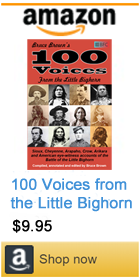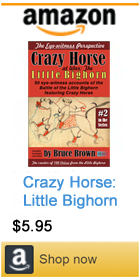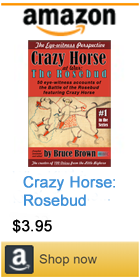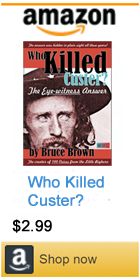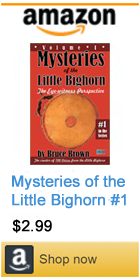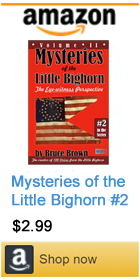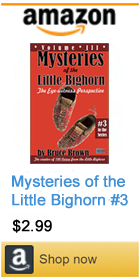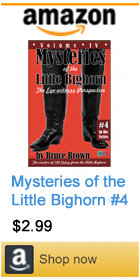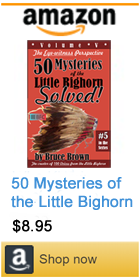|
||||||||||||
Bruce Brown's 100 Voices... Kill Eagle's Story of the Battle, #2
KILL EAGLE'S STORY. A CHIEF FROM THE HOSTILE CAMP ON THE SIOUX WAR. IRON HORN'S AND BELLY FAT'S MEN. "THIS IS THE WAY A BRAVE MAN ACTS," SAYS MAN-WHOSE-BREAST-IS-DOBBED-WITH-MUD. THE CROW CLUB OF THE UNCPAPAS. DECOYED TO THE HOSTILES WITH PRESENTS - FORCED INTO CAMP WITH BLOWS. INDIAN LOSSES ON THE ROSEBUD - THE LITTLE BIG HORN MASSACRE. SITTING BULL ON THE CUSTER FIGHT. Standing Rock Agency, D.T., Sept. 18, 1876. Herewith I send you a copy of the official report upon the statement made to the Indian Agent here by Kill Eagle, a chief of the Blackfeet Sioux, and Afraid-of-Eagles, an Uncpapa Sioux warrior, who were with the hostiles during the late campaign. September 17, 1876. To the Commissioner of Indian Affairs:
I would state that while he was making this statement he surrounded himself by a number of his men, and when he had any doubt as to the correctness of what took place on certain occasions he would call upon them to assist him in remembering all the particulars. I have taken his statement with a great deal of care, and am satisfied from his manner and bearing that he has endeavored to tell the truth. I had two interpreters present, and fully believe that they have given me a correct interpretation. I requested Kill Eagle to make oath to the truthfulness of his statement, and he did so cheerfully and without hesitation. He is fifty-six years of age, has been thirteen years with the whites, and is one of the most intellectual Indians I have met in Dakota. Q. I have come to see you and have you make a statement for me to send to the Great Father. You will be careful to tell the exact truth? A. How. Q. I will commence with you when you left the agency last spring. Let me know why you left and where you have been? Take your time and think, so as to make no mistakes. A. All right. You two interpreters were here, and there was an agent here, but no one told me to go out, I went in accordance with my own judgment. I had heard that there was an expedition going into the Indian country, but as I had heard the same every summer I did not believe it. I was in want of lodges, robes and skins for making moccasins, and I went to get them. I thought I could get them and get away before any of the soldiers got there.
A. I never did so. The man who fired off the pistol did not belong to my band. He was a hostile. He fired off his pistol and said, "This is the way a brave man acts." I did not know he was going to fire. I asked him why he did it. He made no reply. This man was killed in the fight. His name was "The-Man-Whose-Breast-is-Dobbed-With-Mud." Q. Let me know how you got along every day, where you went and how you lived. A. I left this agency last April with twelve lodges belonging to my band and fourteen belonging to other bands. One belonging to Running Antelope, named Dog; one belonging to Iron Horn, named Scarlet Thunder; one belonging to Wounded Head, named Eagle Man; one belonging to Bad Hand, named Bull; one belonging to Medicine Man, named Bear King; two belonging to Belly Fat, named Brave Hawk and The Man Who Walks With His Dogs; two belonging to Two Heart, named Strong and Scarlet Bear; one belonging to Sitting Crow, named Scarlet Eagle; one belonging to Plenty Crow, named Little Eagle; two belonging to Bear Ribs, named Afraid-of-Eagles and Bear Ears; one belonging to Gall named Blue Cloud; one belonging to Lone Dog, who has not returned.
A. That is all that went out with me. Others went out before me. I do not count for them. Q. How many young men did you have with you who have not come back? A. One, Little Wound's son; he died out there. Q. These are all middle aged men. Where are your young men? A. I do not go around all the lodges, my children are all girls. Q. Are there any young men here I have not seen? A. We have no others, only what you have seen. Q. What other people left here before and after you? A. I can't say. Some went before and some after me; they were in different parts of the village. Q. What were the names of the chiefs? A. I can't say. Q. Is "Gall" out there? A. He is; with as big a belly as ever. Q. Is "Rain-in-the-Face" out there? A. I don't know. He was there and I think he came to Cheyenne Agency and went back to the hostiles again. Q. Is "Plenty Crow" out there? A. "Plenty Crow" has never been away; he is here. Q. What about his peoples. A. His son-in-law died out there. There is none of his band out there. Q. Is "Ball-of-the-Foot" out there? A. I have not seen him. I think he is at Fort Peck. Q. Are there any others from here out there? A. I would tell you if I saw any. I was not allowed to go around and see who was there or learn anything. I was watched all the time. I am in earnest when I say they guarded me closely day and night. Q. I have got all the people; now tell me about your journey. A. I went out from here, and camped the other side of the Big Hill. Q. Did you all have guns when you started? A. We had only what we turned in. Q. Did you have plenty of ammunition? A. The sale of ammunition was stopped here before I went away. I was displeased with that, and I thought I would go out and starve anyway. I thought I could kill some game with arrows. Q. Did you have plenty of provisions when you started? A. No, sir. The rations were very scarce; that was the reason I wanted to go out and kill some game. Q. Where did you go the second day? A. I camped at Porcupine Hill; third night at Leafey Butte; fourth night, creek unnamed; fifth night at creek that branches off Cedar Creek; sixth night at the place where they hold the enemy; seventh night, Cedar Creek; eighth night, camped at the head of Cedar Creek; ninth night, on Cedar Creek -- moving up we struck the White Man's Road, leading to the Black Hills; tenth night, traveled up Cedar Creek and camped on it; eleventh night, camped at the extreme head of Cedar Creek, where there was no timber; near this camp there is a place where we get whetstones. Some of my men who went after whetstones returned, riding in great haste and reported that there were white men coming. I answered, "Very good. I will go and see them." We went to see if they were white men, and instead of being white men, it was a herd of buffalo. We killed forty-five of them, including two sick calves. This is what we lived on.
From that day I was to suffer-that evening criers went about the village saying, "A man has come here. You have given him presents and told him to go." The next morning the camp moved, but I remained behind. I pretended not to notice their movements, but the Indian soldiers surrounded my camp and made me move with them, the Indian soldiers marching behind and on both sides of us, so that it was impossible for us to get away. This is when they took us to the Rosebud and went into camp on the Rosebud. At this camp I was called to a grand council and was told they were going to have a sun dance, and such men of mine that did not have horses could get them. They told me this to deceive me. From there we moved up the Rosebud. There was nothing outstanding occurred while we remained on the Rosebud, only that I was watched all the time. On leaving the Rosebud we went to Greasy Grass Creek, camping twice between these two places, and all the time the Indian soldiers were closely watching and guarding us. We camped very close to this creek and all at once there was a great commotion it being reported that white men were coming. I got on my horse and said, "Pity me, my friends, we come from the whites and they want you to listen to me. You are all grown men and must obey me. This nation here fights with the whites (meaning Sitting Bull's and others), but the whites are our friends and we don't bear arms against them." The Indians then went out to battle, but there came a herd of buffalo, and I and my men went after the buffalo and brought back buffalo meat. When the Indians returned from the battle they denounced me as a traitor because I did not go on to the fight and forced me into camp on Greasy Grass Creek. There was a very large camp here, and I was ordered to go on one side of it, but I camped in the middle and there I was continually surrounded by Indian soldiers, at night the soldiers built fires all around my camp. The next day I could see from my camp in the road a great smoke or dust rising. The ponies belonging to all the bands were a long way from our camp, we went after them, but they stampeded. All of my men that you see here went for our horses but we could not catch them, finally we caught some of them and brought them to camp. I then said to my men, "Take your lodges and everything that is valuable and let us flee back to the whites." At this time Sitting Bull's men set fire to the prairie around my lodges and burnt some of my lodges up. They took some of my horses, killed eight of them, and returned the others. They abused and whipped my men, they can show the marks today (a number of his warriors at this time exhibited wounds made by knives, spears and whips. Kill Eagle exhibited quite a large wound on his left hip). They did this because we did not go into the fight with the whites. After this we moved with them, but were never left alone. We were guarded all the time. In this way they brought us further down, and while moving, Sitting Bull's men were hunting game, and our children were starving, for they would not allow us to kill any game. They said to us, "You have no right or title to these buffalo. The white man's food is food for you, and when you get back you can eat it." We got back to Cottonwood Creek, and there I met my grandson (by name Bad Hip). Here is where I first heard any news, and here again they whipped and abused us. They killed another of our horses, belonging to my father-in-law. I could stand it no longer, and I, in return, shot one of their horses. After this they treated us still worse. I got together nine new blankets and went around and made presents of them to the soldiers, but accomplished nothing by it. We then went to Beaver Creek. Here I made a feast of wild turnips (a feast for the children) and called the Cheyenne Indians to it. The Cheyenne Indians all came (four societies represented), and I said to them: "You alone I have before excluded from my councils; this day I take you into my council." Four of the Cheyenne chiefs spoke to me through an interpreter. One chief said: "Your friend speaks to you and says, these Sioux, who are kindred to you, have abused you, notwithstanding your good treatment of them. Now this day you have honored us with your attention." Another chief then spoke, as if with one voice, and said: "You have been mistreated, but hereafter we will protect you. We are 500 lodges strong. Go your way and we will stand between you and Sitting Bull's men." When I got ready to go an old Cheyenne chief came to me and advised me to move in the night; otherwise there might be trouble. The following night it was dark and rainy, and under these we struck our lodges and moved, traveling all the night and most of the following day. While stopping for rest a young man came to me from Sitting Bull's camp and told me, "the Indians have been ordered out to stop us." That evening, just at dark, my brother-inlaw, who stopped on a hill to watch, reported that a body of Indians were in sight after us. Upon receiving this information, our flight pellmell, everybody for their own life, was continued all night and all the next day-it was wonderful how the children stood the hardships-and we arrived at Grand River that evening. Now we were back on Grand River and near "Black Horse Butte," and the reason that you now see me alive is that there we found wild fruits and berries. On this side of Grand River seven of my horses gave out and I had to leave them. When I came into camp where I have been so long I found turtle, fish and beaver, and this was our food. I staid there not because I was afraid to come in, but because there was plenty of this kind of food and I was feeding the children on it. When I came to my last camp I wanted to come in very much. I heard some things from the whites while here that frightened me; still I was not afraid. There was an Ogalalla Indian that came into the agency to look for his wife; he came into our camp and told us that we would all be hung, together with our children; but I did not fear it. You have said that I am charged with remaining out in camp, and that my friends from the agency have supplied me with food to enable me to do so. The Ogalalla Indian's name was Ridiculous, he belongs to the hostiles and has gone back to them again. I had heard all these bad reports, but I was still willing to accept whatever was in store for me, and was resigned to my fate. You have asked me to speak truthfully, and I am going to. After hearing this, bad news, I saddled my horse and came in. I came down here and went to the interpreter's house (my grandson). He was asleep when I got there. I told him that I wanted to see the agent and then the other authorities in turn. He came with me then to see the agent. I stood on the other side of the warehouse and he went to the agent's house. The agent's people were asleep; he knocked at the door; the agent opened the door and said to the interpreter; "What is Kill Eagle afraid of? Why don't he come in? Let him come to me and I will give him advice and then take him to the commanding officer." I went back to the Blackfeet's camp, and at daylight I went to my own camp. When I arrived there I told my own people to move and we would go into the agency. We moved closer in, and here is where I was taken sick with a sore throat and could eat nothing but broth. While lying in this condition the men sent out by the agent arrived in camp. The horses that these men rode out there were tired, and as Little Wound had also slipped away from the hostile camp and was only a little way off, and wishing to have him come in too, I laid over. This is all. Q. Did Sitting Bull give you any arms or ammunition before the Rosebud fight? A. No, sir. Q. What did you do for ammunition to shoot game on the way? A. We were brought up to shoot buffalo with arrows and this is what we shot them with. Q. What time of the day did the fight commence on the Rosebud? A. We did not get near the fight. Q. Did you hear the firing? A. It was too far away, but I heard them tell about it when they came back. Q. Was Sitting Bull in command at the fight? A. Sitting Bull started out with them in command. Q. How far was it from your camp to where the fight was? A. At least forty or fifty miles. Q. What did Sitting Bull do with the women and children? A. After Sitting Bull's party went out to battle, my party went out to hunt buffalo. Having an opportunity when the warriors left we brought in meat and had it cooking, when all at once there was a great commotion in camp and all the lodges were taken down. Here I thought I would have an opportunity to get away, as Sitting Bull's men were greatly confused and at a loss to know which way to go. I said to my men, "We will flee to where we came from." The excitement subsided and the lodges were put up again, near where they were before, and that evening began returning from the fight, some returning the next morning. This is when they cried about the camp that they were going to kill us, as they had lost some of their young men and we did not go to help them in the fight. A man who had cut himself all up on account of having lost a son in the fight, came to my lodge and shook hands with me, and told me to go to the centre lodge, where the warriors were assembled. I now expected to be killed. 1 went to this lodge; people were crying around it, and warriors were assembled in it. When I got there this man came back and shook hands with me again and said: -- "This nation of hostile Indians are all fools; this man came out here to trade, and belongs to the whites and is not pleased to stay, but you draw weapons on him and abuse him. You nations of hostiles here made war on the whites. My only son has this day gone to the spirit land; if any of you here undertake to molest this man (Kill Eagle) I will stab you and cut you up." Q. How many warriors had Sitting Bull in this battle? A. A great many. I could not tell how many. Q. How many roads did they take? A. I could not tell. Q. Did they cover much country? A. They went by the file, filing up the creek, a small ravine from the camp. Q. Were the warriors all on foot? A. It was a good ways and they would not be able to go on foot. Q. Did they have plenty of arms and ammuntion? A. They seemed to have. I could not tell, as I had not opportunity to get about to see them. All the Indian soldiers who were guarding me had splendid arms. Q. Did they have needle guns? A. They had all kinds of guns; Henry rifles, Winchester, Sharps, Spencers, muzzle loaders, and many of them two or three revolvers apiece; all had knives and lances. Q. Did you hear them say where they got these arms? A. I heard some of them say where they got them. I heard the Cheyenne Indians say they had always been hostiles, and they captured theirs in battle. This is the only way I heard them say they got their arms. Q. Did you hear anyone say where Sitting Bull got his ammunition? A. I was not permitted to run about the camp, and did not hear about it. Q. Did any of your men hear about it? A. I was not allowed to go around, and my men were used worse, and not allowed to go anywhere. Some of my men proposed to steal a lot of Sitting Bull's horses and flee; but I advised them not to do it, as we would all be killed. Q. Did the soldiers who were guarding you have plenty of ammunition? A. Yes, their belts full, and the best kinds of arms, fixed ammunition, metallic cartridges. All of us here had very bad guns. You see what we turned in. Q. In this fight how many Indians were killed or wounded? A. Four killed and left on the field, who were mutilated by Crow Indians, and twelve died in the camp. It was impossible to say how many were wounded, there were so many-nearly 400. The four killed fell near the Crow lines, and they cut them up and scalped them. One hundred and eighty Indian horses were killed. They numbered them at the Statemen's lodge after the battle. Q. What did the Indians report about killing white men? A. When we were in the council lodge, smoking, a warrior named Black Moccasin (a Cheyenne) brought in a white man's arms; he began beating me and my men over the head and shoulders with it, and said "Here is your husband's hand." Q. Did they say how many were killed? A. I did not hear how many. Q. Did they have any white men's scalps? A. They brought in Crow Indian's scalps and beat us over the head with them. If ever one of these men comes into the agency, I vow to kill him. I will tell you the way they abused me. My daughter (holy woman) traded a horse for a large, fat dog. She had it out dressing it, and the Indian soldiers came and snatched it away from her, and we were starving and needed it badly. I can never forgive this abuse. The Indian soldiers came to our camp, lariated and stole all our dogs. Q. What did the Indians say about who won the fight? A. They said that they had been whipped, and that the white men charged them. Q. Did they get any horses and mules there? A. No, sir. The white men captured a good many of their horses that had given out, beside 180 killed. Q. How long did you remain in the camp after the fight? A. We moved the next day to where the Indian soldiers took the dog from my daughter. Q. Where did you go from there? A. After the Rosebud fight the camp moved on to Greasy Grass Creek, at once. Q. How long did you stay there? A. One day. Q. Where did you go next day? A. We moved this way. Q. Tell us about the Custer fight. A. We were coming down the tributary of Greasy Grass Creek after the battle was fought on the Rosebud. (Here he makes a sketch of the battlefield on the ground.) We crossed the Greasy Grass Creek, went down and camped on it. The troops struck our trail on the tributary, followed it down, swam their horses over Greasy Grass Creek and struck the camp at the upper end, where there was a clump of timber, and opened the fight. When the firing commenced the Indians rushed to the scene of action. I and my men were lower down, about the middle of the camp. The Indians drove the soldiers back out of the timber, and they recrossed the Greasy Grass Creek below the mouth of the tributary, taking their position on the hill, bare without any grass. They were reinforced by the soldiers who had not crossed the creek (Colonel Benteen and Captain McDougall). Before retiring across the creek the soldiers (Colonel Reno) got into camp and set fire to some of the lodges. On retreating across the creek to take position on the hill, they left their dead behind them. Another party appeared on top of a long hill moving toward the south. After quitting the party on the hills word came that soldiers were on the left across the creek, and there was great excitement in the camp, the Indian warriors rushed to the left to meet the troops. The Indians crossed the creek and then the firing commenced. It was very fast at times and then slower until it died away. (He describes the firing as follows: He claps the palms of his hands together very fast for several minutes, stopping suddenly, which denotes the sound of the firing when they (Custer) first began. After a few seconds elapses he repeats the same as above and continues but all the time lessens the quickness of the patting and sound until it suddenly dies out.) The United States troops were all killed on the east side, none crossed the stream. I got the following information from Sitting Bull himself: "After crossing the creek with his warriors he met the troops (Custer) about 600 yards east of the river. He drove the soldiers back up the hill. He then made a circuit to the right around the hill and drove off and captured most of the horses. The troops made a stand at the lower end of the hill, and there they were all killed. In going around the hill the Cheyenne Indians killed a warrior, thinking he was a scout who left his agency; but he was not, he was a hostile." Q. How long did the fight last on the right? A. It was about noon when they struck the camp and it only lasted a few minutes. The fight at the lower end (under Custer) was not finished until near sunset. [Note: Curley said the fight started "about 2:30 or 3 o'clock p. m., and continued without intermission until nearly sunset."] Q. Did all the warriors leave the right to go to the left? A. They did; the whole thing left. Q. What did they do after killing all the troops ? A. At first a Cheyenne Indian came in with a war bonnet and proclaimed: "I have killed three soldiers but they have killed me at last." He was wounded in three places. They kept continually coming in with wounded, thrown over horses, with their heads hanging down and blood running out. About sundown they all returned and said:"We have killed them all; put up your lodges where they are." They had just begun to fix their lodges that evening, when a report came that troops were coming from toward the mouth of the creek. When this report came, after dark, the lodges were all taken down and they started up the creek. I told my men to keep together, and we would try to get away. Some one told on me, and they said "let us kill him and his band, we have lost many young men today, and our hearts are bad." We travelled all night and next day after crossing Greasy Grass Creek. We encamped near the foot of the White Mountains. That night, while I was asleep, I heard a man calling. I woke my people up, and this man proved to be a Cheyenne Indian, belonging to a party that had been off on the warpath in the White Mountains. He reported that he had seen a great many soldiers -- no end of them -- crossing along the base of the mountains. Next morning the warriors left the camp with led horses and started off to meet the troops, who were reported coming, so that the women and children would not be near the fight. This was three days after the Custer fight. Some of the horses got worn out and some of them returned and said they had struck a white man's trail, and were following it into the mountains. Others came back and said eight Cheyenne Indians had engaged the whites -- their horses were better than the others. One Cheyenne, noted for bravery, and who wore a war bonnet, was shot through the head and killed and brought back to camp. The Indians were approaching the soldiers when this one was shot; they dragged him back by the feet. After this a number of other Indians crept up and found the horses tied there, but no one with them; they took the horses and returned to camp. From this camp all went up to the Rosebud; this is the place I escaped from. Q. How many Indians were killed on the right of the camp, in the fight with Reno? A. Fourteen were killed on the field with Reno --and thirty-nine died on the field with Custer. I know of seven who died of wounds within camp afterward. Q. How many were wounded? A. A great many. I would judge about 600wounded in every way, head, hands, arms, body, etc.-nearly all I saw were wounded more or less. A lot of Ogalalla Sioux ranged in line and called me to look at them, and said: "Here are the wounded on one hand;" there were twentyseven on travois and thirty-eight on horseback. There was a Cheyenne woman who had a revolver strapped on her and went into the fight and got killed. Q. Did Sitting Bull take any prisoners alive in this fight? A. He did not; he took no one alive; it was like a hurricane; and swept everything before it. Q. Did they scalp any white men? A. I did not see any. Q. Did they burn or torture any of them after the battle was over? A. There was one became separated from Reno's command and two Cheyennes gave him chase and overtook him and killed him. Q. Did they scalp him? A. I do not know. Q. After the fight did you have a big dance? A. No, sir; the soldiers were reported coming from the mouth of the creek, and everyone fled. Q. What did they do with the arms, ammunition and horses captured? A. They have them. A great many horses died of wounds and fatigue. Whoever captured them kept them. Q. How many warriors do you think were in Sitting Bull's camp? A. I cannot say; they were like maggots on a carcass. Q. Who were the principal chiefs aside from Sitting Bull? A. Crazy Horse of the Ogalalla Sioux; Big Man, of the Ogalalla Sioux; High Elk, of the Sans Arc, killed by Reno, and the head chief of the Cheyennes [Lame White Man], killed by Lieutenant Sibley's party. Q. Were there any Indians killed in this fight belonging to this agency? A. Not that I know of. Q. Were there any wounded? A. Yes, one; the Rattler's son. He is out there yet. Q. Did you have plenty to eat during the fight? A. No. The Cheyenne Indians ate the horses killed in the battle. I had a little buffalo meat left. Q. How do the Indians go into battle -- does each chief lead his own band? A. They go without discipline, like bees swarming out of a hive. Q. Did you have plenty of grass for the ponies? A. Yes. Q. Could you kill any game during this time? A. Now and then an antelope, which the Indians would kill. Q. Were there any white men among the Indians? A. There was no white men in the camp that I saw. Q. Was there not a man who blew a bugle call like a soldier? A. There was, but it was blown by a Indian. Q. Has Sitting Bull any white women in his camp? A. No. Q. What do you think Sitting Bull is going to do now? A. I did not hear. I slipped away in the night, but there is a man here -- a prisoner -- who will probably know -- Bear Rib's brother. Q. Do you think he will fight next summer? A. I can't say. Q. Did Rain-in-the-Face cut out the heart of a dead officer and show it around the camp on a stick? A. Rain-in-the-Face was with me; he did not do it. Q. Did not some of the young men here take you out some beef and coffee, when you were in camp out in the country, before you came in? A. No one brought me anything; neither sugar, coffee, flour, tobacco or anything. Q. What time of the evening was it reported in the hostile camp that soldiers were coming on the left of the camp? A. The sun was just going down. Q. When Reno was driven across the creek where was Sitting Bull? A. I don't know. Q. What were the families doing when the fighting was going on on the hill? A. The women fled to the lower end of the camp and left everything. Q. What did they do when they heard the firing on the left by Custer? A. The upper end of the camp was at this time all deserted, and at the lower end they took down the lodges and packed them for flight. Q. In what direction did you hear the troops were coming again? A. The men who were out after their horses, after the Custer fight, came in and said, "More troops are coming up the creek from the Yellowstone River. Q. Did you see Sitting Bull that day? A. I did not. Q. I heard Sitting Bull stayed in his council tent, away from the battlefield, and urged his men forward. A. This is probably so, but I don't know. Q. What time of night did everybody leave the camp? A. Just at dusk. Q. Did the women, children and lodges, or did the warriors go first? A. The women, children and old people went first, the warriors in the rear. Q. How long was the camp-how many miles? A. About six miles long. Q. How wide? A. About one mile wide. Q. Were the tepees close together? A. Just as thick as they could be put up. Q. What part of the camp was Sitting Bull in? A. He was camped near where the soldiers, who took their horses in the woods, attacked. Q. What kind of a lodge has Sitting Bull? A. He has a very large skin lodge. Q. How many wives and children has Sitting Bull? A. Two wives and four children. Q. Does any one else live with him? A. His sister did, but she died this summer. Q. Are Sitting Bull's soldiers camped near him? A. They are camped about the middle of the camp. Q. What part of the camp was the council tent? A. Near the centre; it was painted yellow, and holds a great many when they crowd in. Q. How old do you think Sitting Bull is? A. About forty years. Q. What is the color of his stair; I heard it was light? A. He has light hair. Q. Is he light himself? A. He is not a white man; you can't expect an Indian to be white. A. About five feet ten inches; he is very heavy and muscular and big around in the breast; he has a very large head; his hair is not long, it only comes down to his shoulders. Q. How does he dress? A. He changes his dress so often I can't say; the last time I saw him he had on a very dirty cotton shirt. Q. What does he wear on his hair in battle? A. I don't know, I did not see him in battle. Q. Do the Indian soldiers strip off when they go into a fight? A. Yes. Anybody who has a war bonnet wears it; it is made of long eagle feathers and trails behind him. Q. I have heard that after the Custer fight, the Indians went back to the other end and attacked there again. How is it? A. That is correct; the Indian soldiers went back and attacked the troops (Reno) on the hill again. Q. Did you hear the firing? A. Yes, I heard the firing while moving away. Q. How far away were you in the morning? A. We never stopped; we just crossed Greasy Grass Creek in the morning, the soldiers were in the rear. Q. Did you hear any firing in the morning when you were crossing the creek? A. We got out of hearing of the firing long before morning. Q. What time next day did the Indian soldiers join the party? A. They were overtaking us all day, coming in in squads. Q. What did they report? A. I did not hear what they said. Q. Did they say they could not drive the troops (Reno) off the hill? A. A few days after when the excitement died away they said they could not drive the troops off the hill. Q. Did you see any of the Indians wearing soldier's clothes after the fight? A. I did not. I saw lots of soldier's horses and arms. Q. I have heard that there was a Spaniard fighting with the Indians. Did you see him? A. There was once a white man in camp, but he went to Spotted Tail's before the fight. his mark, X WAN-BLI-KTE or KILL EAGLE Chief of Blackfeet Sioux The Custer Myth: A Source Book of Custerania, written and compiled by Colonel W.A. Graham, The Stackpole Co., Harrisburg, PA 1953, p 47 - 56
Kills Alive and One Bull said Kill Eagle lied when he said he was held captive in Sitting Bull's camp on the Little Bighorn. Actually, they said, he was in council with Sitting Bull when the first reports of the Americans' sucker-punch attack came in. Here's another account by Kill Eagle.
|
||||||||||||



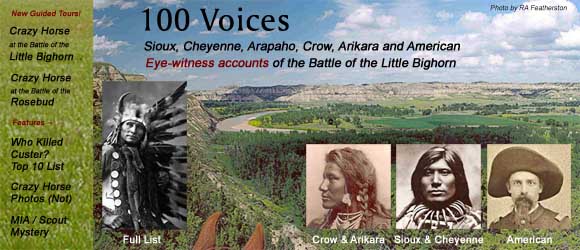
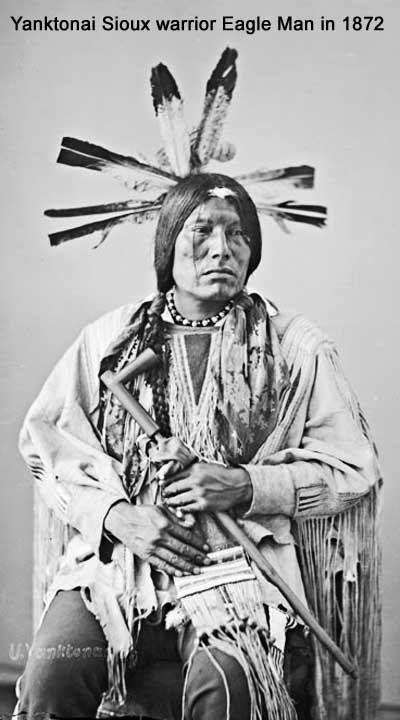
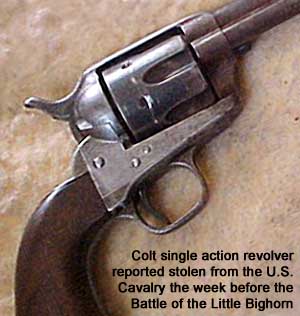
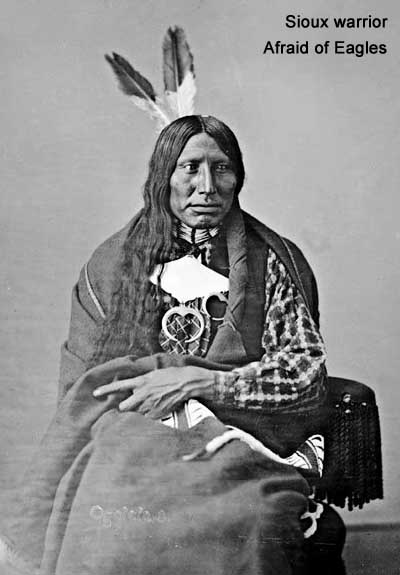 Q. Did any other lodges join you in your way out to the hostile camp?
Q. Did any other lodges join you in your way out to the hostile camp?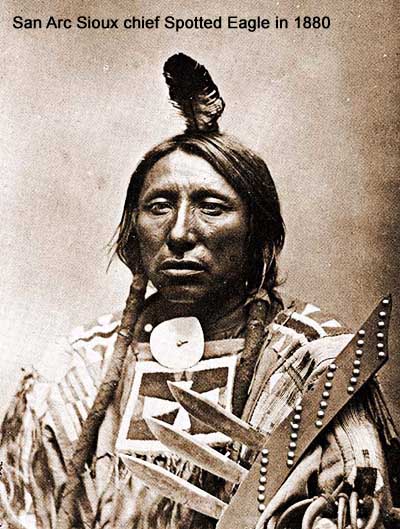 I then called my men to a feast of buffalo meat and said, "This is what induced us to leave the agency. Now we have got it we will turn by a round about way, and return to the agency." My brother-in-law (who is dead), said, "No; here is the village over at the place where they get blue earth (meaning
I then called my men to a feast of buffalo meat and said, "This is what induced us to leave the agency. Now we have got it we will turn by a round about way, and return to the agency." My brother-in-law (who is dead), said, "No; here is the village over at the place where they get blue earth (meaning 